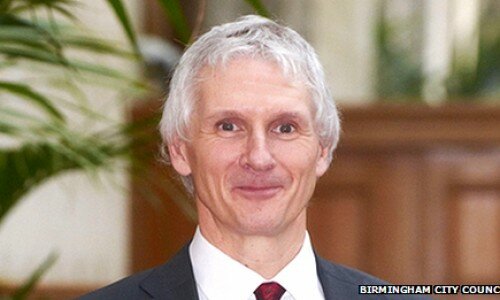
Town halls need ‘fiscal revolution’ not top-down devolution, says Birmingham council chief
There can be no real devolution in the West Midlands until local authorities are permitted to pay for infrastructure investment by raising local taxes, the chief executive of Birmingham city council has warned.
Mark Rogers said Ministers retain too much control over devolution packages and are “determining the pace and direction of change, with local areas appearing to be as much reactive as proactive as they jump when asked for new ideas and engaging in a glorified bidding process”.
While broadly hinting that West Midlands councils and LEPs are on the verge of agreeing additional devolved powers with the Government on top of an £8 billion deal agreed last year, Mr Rogers put the case for embracing a European fiscal framework where councils and regions raise significant sums of money through local taxation schemes.
, Mr Rogers said:
The biggest wall we need to break down is the one around the whole agenda of fiscal devolution. To put it bluntly, there can be no real devolution without true local control of taxation and more freedom on how public money can be spent.
Tax set at a sub-national level in the UK is equivalent to just 2.5 per cent of GDP, compared with 15.9 per cent in Sweden, 10.9 per cent in Germany and 5.8 per cent in France.
Even with the re-localisation of all business rates from 2020 we will not have control over the level of rates and we will still not be free to set the council tax rate, to adjust the bands to suit local needs, or to levy a Supplementary Business Rate above two per cent.
Ministers are thought to be reluctant to support local taxation schemes, citing the experience of the 1970s and 1980s when business rates and domestic rates bills soared as councils embarked on a variety of controversial local spending schemes.
The Government continue to insist that any increase in council tax above 1.99 per cent must be put to a referendum of local electors. The powers of metro mayors to raise business tax will be constrained to two per cent and any increase must be approved by business-led local enterprise parnerships.
Mr Rogers has gone beyond calling for councils to be given powers to raise council tax and business tax, he also wants other areas of taxation “taken for granted in other countries”, such as hotel taxes, and the possibility of localising other taxes such as Stamp Duty or Vehicle Excise Duty to be examined. He added:
The devolution debate so far has concerned the localisation of functions. Opening up the fiscal devolution box would support a strategy that gives us genuine freedom to design local investment programmes and local public services to better meet the needs of local people and local businesses.
During the year ahead the Government is seeking to engage with local government about how the post 2020 system will work. We must make sure that debate is not just a narrow discussion of business rates, tariffs, top ups and incentives for house building.
We must insist that the finance system supports a vision for real devolution – a revolution not an evolution. And we must make sure that Birmingham and the West Midlands play a leading role in that debate.
Mr Rogers described the Cities and Local Government Devolution Act as “a peculiarly English approach to policy making” which left the Government “in the driving seat”. He added:
Not for us the sweeping introduction of new structures of local government across the board seen in France or the neat federal constitution of Germany.
Instead, the Act is what those in Whitehall call an enabling measure. It allows the Secretary of State to devolve any function to any local area and to create combined authorities and new metro mayors with additional powers.
But it does not define what these powers should be, nor the geographical areas that will receive them. It does not make devolution happen.
The devolution deals agreed so far have tended to look fairly similar and there are some fairly strong walls around the places that government will not let us go at the moment. That is the downside of an enabling approach – it does appear to leave the government very much in the driving seat and determining the pace and direction of change, with local areas appearing to be as much reactive as proactive as they jump when asked for new ideas and engaging in a glorified bidding process.
The shadow West Midlands combined authority has set up a devolution strategy group to plan future deals and enable the region to lobby more effectively at Government level.
Mr Rogers said:
We aim to develop a West Midlands model of devolution, not follow a standard blueprint.
We must also look now at how combined authorities and mayors can engage more effectively with local communities and how we can link together the different levels of city governance and the two themes of public service reform and economic growth. We can also develop a distinct approach through our work across the three Local Enterprise Partnerships.
Similar Articles
Who can beat the Street? 0
You could be forgiven for not realising we are in the foothills of the very
Mayoral Mayhem? A challenging year begins…
The Board of the West Midlands Combined Authority (WMCA) meets this morning for the first
Council: Panel stands down, but recommends another one pop up
The Panel set up to oversee improvements to Birmingham city council has disbanded itself and
Brexit Watch: The List
We are living though extraordinary political times. The only thing to do in such circumstances
Birmingham City Council – a beacon (yes, you read that correctly)
They’re a tricky business, industrial relations, and I normally steer well clear. However, when the










